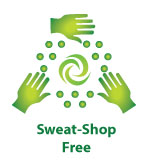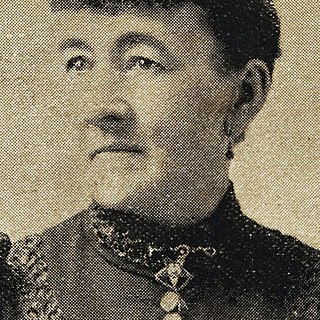Gallery
- Sweatshop inspection in Chicago, Illinois, 1903
- Women protesting sweatshops, The Embarcadero, San Francisco, 2008.
No Sweat is a broad-based not-for-profit organisation with HQ in London's Kings Cross, England, which fights for the well-being and protection of sweatshop labourers, not only in developing countries but also in Britain.
Working with the GMB Union in London's East End, in the London Borough of Tower Hamlets in 2005, the organisation infiltrated and exposed sweatshops operating for Topshop [1] and reported those involved to the authorities. No Sweat encourages consumers to choose ethically sourced clothing, whilst firmly rejecting boycotts which only lead to factories being moved further from the limelight, further increasing the dangers to those trapped in the cycle of wage slavery.
The organisation works variously with parts of the TUC and other trade union organisations, the National Garment Workers Federation and closely cooperates with the Ethical Threads clothing company in Britain. It is also aligned with other campaign groups like Labour Behind the Label, and with "No Sweat Apparel" in the United States. Independent of political influence, the group seeks to reach out to all parts of the global community to help stamp out sweatshop labour fullstop - often dealing directly with groups of workers that would normally have no voice and no support outside their immediate community - for example Batay Ouvriye in Haiti and individuals like jailed union official Ali Nejati in Iran.
They hold numerous events in London, Sheffield, Glasgow, Brighton and elsewhere around the United Kingdom, and have a presence at many events such as Glastonbury Festival's Leftfield and many smaller counter-culture festivals and gigs.
Recently the organisation has been running a successful comedy night on the 2nd Thursday of each month in London's Cross Kings basement rooms, guest acts have included Mark Thomas, [2] Josie Long, Rob Newman, Robin Ince and Simon Munnery as well as live podcasts from established acts such as Richard Herring and Andrew Collins [3] and legendary punk filmmaker Don Letts.
These events all aim to publicise the plight of sweatshop workers (children and adults) around the world as well as giving a platform to other, less prominent groups where appropriate and have developed a reputation as the last bastion of genuine counter culture in the now hyper-developed Kings Cross area.
In April 2009 the BBC news and Times newspapers covered a No Sweat fashion parade outside Primark's flagship Oxford St store - [4] an event organised in response to recent outcry over the company's atrocious labour policies and relationships with subsidiary contractors who make regular use of child labour, as highlighted by the BBC's in 2006.
The group's activities are primarily two-fold, firstly to organise direct action campaigns to pressure the big brand companies that exploit people through sweatshop labour, secondly to work with independent organisations around the globe to support vulnerable people and help them to unite together and stand up to their employers, demanding safe working conditions, decent hours and a living wage as well as independent trade union rights to protect them from malicious attacks and extreme exploitation.
They are volunteer-run, and anyone can get involved.

A sweatshop or sweat factory is a crowded workplace with very poor, socially unacceptable or illegal working conditions. Some illegal working conditions include poor ventilation, little to no breaks, inadequate work space, insufficient lighting, or uncomfortably/dangerously high or low temperatures. The work may be difficult, tiresome, dangerous, climatically challenging or underpaid. Workers in sweatshops may work long hours with unfair wages, regardless of laws mandating overtime pay or a minimum wage; child labor laws may also be violated. Women make up 85 to 90% of sweatshop workers and would be forced by employers to take birth control and routine pregnancy tests to avoid supporting maternity leave or providing health benefits. The Fair Labor Association's "2006 Annual Public Report" inspected factories for FLA compliance in 18 countries including Bangladesh, El Salvador, Colombia, Guatemala, Malaysia, Thailand, Tunisia, Turkey, China, India, Vietnam, Honduras, Indonesia, Brazil, Mexico, and the US. The U.S. Department of Labor's "2015 Findings on the Worst Forms of Child Labor" found that "18 countries did not meet the International Labour Organization's recommendation for an adequate number of inspectors."

Sir Philip Nigel Ross Green is a British businessman who was the chairman of the retail company the Arcadia Group. He owned the high street clothing retailers Topshop, Topman and Miss Selfridge from 2002 to 2020. As of May 2021, his net worth was estimated at £910 million.
Charles Patrick Kernaghan was the executive director of the Institute for Global Labour and Human Rights, formerly known as the National Labor Committee in Support of Human and Worker Rights, currently headquartered in Pittsburgh. He is known for speaking out against sweatshops, corporate greed and the living and working conditions of impoverished workers around the world.

Guess is an American clothing brand and retailer, producing clothing for men and women. Guess licenses its brand on other fashion accessories, such as watches, jewelry, perfumes, bags and shoes.

Wage labour, usually referred to as paid work, paid employment, or paid labour, refers to the socioeconomic relationship between a worker and an employer in which the worker sells their labour power under a formal or informal employment contract. These transactions usually occur in a labour market where wages or salaries are market-determined.
Ethical Threads is a clothing manufacturer based in the United Kingdom. The company is wholly owned by the Battersea and Wandsworth Trades Union Council and the London Region GMB Union. The company was created as a source of ethical non-sweatshop clothing, and all producers follow international conventions of workers rights and will not employ child labour. Ethical Threads' organically grown cotton is supplied by the Vasudha Cotton Project in India to the Oeko-tex standard.
The Institute for Global Labour and Human Rights, formerly known as the National Labor Committee, is a non-profit, non-governmental organization (NGO) that investigates human and labor rights abuses committed by large multinational corporations producing goods in the developing world. Today the Institute is headquartered in Pittsburgh, Pennsylvania, with offices in Bangladesh and Central America. Charles Kernaghan currently serves as the Executive Director. The Institute publishes investigations with the goal of influencing public opinion and corporate policy. It is widely considered to be the organization that began the late-20th-century anti-sweatshop movement in America.
Labour Behind the Label (LBL) is a UK-based not-for-profit co-operative organisation with an office in Easton, Bristol, which campaigns for workers' rights in the clothing industry. It is the platform of the international Clean Clothes Campaign in the United Kingdom. LBL's members include trade unions and their local branches, consumer organisations, campaign groups, and charities.

The International Labor Rights Forum (ILRF) is a nonprofit advocacy organization headquartered in Washington, D.C., U.S., that describes itself as "an advocate for and with the working poor around the world." ILRF, formerly the "International Labor Rights Education & Research Fund", was founded in 1986, and the organization's mission statement reads: "ILRF believes that all workers have the right to a safe working environment where they are treated with dignity and respect, and where they can organize freely to defend and promote their rights and interests. ILRF works to develop practical and effective tools to assist workers in winning enforcement of protections for their basic rights, and hold labor rights violators accountable."

The Fair Labor Association (FLA) is a non-profit collaborative effort of universities, civil society organizations, and businesses.
The Chinese Staff and Worker's Association (CSWA) is a nonprofit, nonpartisan workers' rights organization based in New York City which educates and organizes workers in the United States so that they may improve their working conditions. It primarily assists workers in restaurants, the garment and construction industries, although it is active among workers in a variety of professions. The organization serves workers from all backgrounds, most of its members are Chinese and most of its efforts directed at employers in Chinatown.
Anti-sweatshop movement refers to campaigns to improve the conditions of workers in sweatshops, i.e. manufacturing places characterized by low wages, poor working conditions and often child labor. It started in the 19th century in industrialized countries such as the United States, Australia, New Zealand and the United Kingdom to improve the conditions of workers in those countries.

Sweatshop-free or sweat free is a term first used by American Apparel, a famous American clothing brand, which means coercion-free, fair-compensation for the garment workers who manufacture their products. The aim of sweatshop-free wish to ensure that all employees are treated fairly and products are made in good working conditions. Sweatshop-free standards include the right to collective bargaining, non-poverty wages, safe workplaces, back wages, and non-harassment. It has been heavily featured in American Apparel’s advertisements and become a common term in the garment industry.
Nike, Inc. has been accused of using sweatshops and worker abuse to produce footwear and apparel in East Asia.

Fair Wear Foundation is an independent multi-stakeholder organisation that works with garment brands, garment workers and industry influencers to improve labour conditions in garment factories. Receiving the Fair Wear stamp of approval does not guarantee any existing quality of labour standards, instead only demonstrating a stated interest in working toward improvement.
Microwork is a series of many small tasks which together comprise a large unified project, and it is completed by many people over the Internet. Microwork is considered the smallest unit of work in a virtual assembly line. It is most often used to describe tasks for which no efficient algorithm has been devised, and require human intelligence to complete reliably. The term was developed in 2008 by Leila Chirayath Janah of Samasource.
Clothing industry or garment industry summarizes the types of trade and industry along the production and value chain of clothing and garments, starting with the textile industry, embellishment using embroidery, via the fashion industry to apparel retailers up to trade with second-hand clothes and textile recycling. The producing sectors build upon a wealth of clothing technology some of which, like the loom, the cotton gin, and the sewing machine heralded industrialization not only of the previous textile manufacturing practices. Clothing industries are also known as allied industries, fashion industries, garment industries, or soft good industries.
SACOM, or Students and Scholars Against Corporate Misbehaviour is a non-government organization founded in 2005 by a group of students and scholars from tertiary institutions in Hong Kong. SACOM monitors and publicizes the misconducts of multinational corporations through first-hand investigations in supplier factories.
The labour movement or labor movement consists of two main wings: the trade union movement or labor union movement on the one hand, and the political labour movement on the other.

Elizabeth Chambers Morgan was an American labor organizer, social reformer, and socialist agitator based in Chicago, Illinois. She immigrated to the United States from England with her husband Thomas J. Morgan in 1869. She is known for exposing sweatshop conditions in Chicago. From 1888 to 1895 she was the leading woman in the Chicago labor movement.